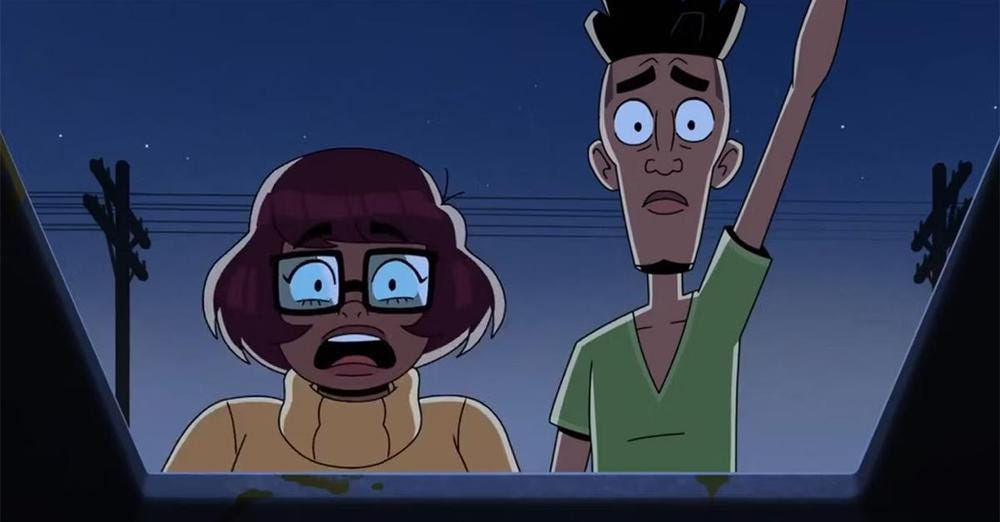You may, by now, have heard of the hullabaloo regarding Velma, the HBO Max series by Mindy Kaling that's based on the Scooby Doo characters. Velma, a prequel story about how the Mystery Machine gang got together, has been utterly savaged by viewers. Its IMDB rating is 1.3/10 and its Rotten Tomatoes audience score is 6%.
Absolutely brutal.
They should have seen it coming.
The Critical Drinker over at YouTube offers this eight minute deconstruction, detailing how the show is riddled with every woke cliche you can think of.
Which brings us to the question, WHY?!
Times past, studios would green-light sequels like crazy, even when the ideas and scripts were garbage from the outset, because sequels (as I recall reported back then), were usually good for 80% of the original's box office. They were safe plays. Probably lower up-side, barring the occasional smash hit, but far less chance of total bomb. Since Hollywood is a business, these made business sense, even if they were unoriginal dreck.
But, nowadays, these remakes don't seem as driven by money goals. Instead, they appear to be the product of woke-capture, of studios looking to ham-fistedly ram the diversity, equity, and inclusion (DEI) narrative down our throats.
This doesn't fully answer the "why" question regarding remakes, re-imaginings, reboots, prequels, or sequels. After all, there's no chance of offending a loyal fan base when you create original content.
The balance of the answer isn't hard to figure, though. The producers of those remakes, re-imaginings, reboots, prequels, and sequels figure the name and character recognition will attract more eyeballs, just as the sequel-makers of yore sought the reduced risk of derivative material vs originals. Setting aside the money people - their motives are always the same - it's cynical but obvious to conclude the creators of wokeified versions of old classics hope to exploit existing audiences.
So, rather than spinning a tale of mystery involving some whole-cloth characters and blue-sky creations, Velma's green-lighters probably figured "everyone knows Fred, Daphne, Velma, and Shaggy, so let's piggyback that high Q rating to give our new show a leg up."
When a show is done well (and for a perfect example, look at Wednesday on Netflix), this can work brilliantly. Fans usually clamor for more content with favorite characters. The big caveat here is that the characters are more than just names. Their fundamentals, including appearance, and the stories they're written to, are what persevere across decades. Corrupting or rewriting those fundamentals in the name of social justice or woke-inculcation or inclusivity or whatever jargon you want to apply is guaranteed to raise some hackles. Careful writers can work some of that stuff in with success, and such may very well enhance the new offerings (and accomplish whatever woke mission they're on without turning people off). Indeed, some content benefits from a bit of modernization. But, as The Critical Drinker noted, riddling a show with every cliche in the book just to be more woke than thou is a recipe for disaster.
Sure enough, the show is a disaster.
Such a disaster that some angry leftists (is there any other type?) are suggesting the show is a Trojan Horse intended to give the angry Right some ammunition, but that sounds like sour-grape conspiracy garbage. The entertainment industry is a tone-deaf echo chamber stuck in a positive feedback loop, so that being woke enough means being more woke than last week.
Velma would probably have been lambasted as dreck even if it was original content with no attachment or similarity to any old source material, but the connection to the Scooby Doo franchise amplified the backlash. This is a case of the old "safe bet" strategy backfiring in spectacular fashion. Unlike a bomb sequel, which would disappear from the theaters in a couple weeks and be forgotten soon thereafter, streaming content has longevity and cultural persistence when it stands out. Velma may taint future woke-gressive efforts for a long time.
These remakes, re-imaginings, reboots, prequels, and sequels are remoras hitching rides on people's favorite content. Actual remoras provide benefits to the ever-moving sharks they cling to, and in that vein, some new content can please fans, enhance the original product, and expand the canon. But, shows like Velma are more like lampreys, corrupting and sucking the life out of their hosts. That may not matter to the social justice warriors. After all, if a show need to be DEI’d in their eyes, perhaps it'd be better to kill it off than leave it in original form.
The similarity between DEI and DIE didn’t escape my notice. Make of that what you will.
Thank you for reading! If you enjoy The Roots of Liberty, please subscribe (if you have already, thank you!), please hit that “like” button to let me know, please share any article you like wherever you roam the Internet, and please recommend the blog to your friends.
If you really like The Roots of Liberty and want to help keep it rolling, please consider becoming a paying subscriber here at Substack, or at a lighter level as contributor to the blog via Patreon.
Thank you, again, for your support!
Peter





Better title than Velma: "The Animated Cosplay Adventures of Mindy Kaling"
The current trend of badly written derivative content is traceable back to the successes of Twilight and 50 Shades of Grey, which showed investors that fanfiction authors writing self-insertion dreck should be treated seriously. The social justice mind virus captured the fanfiction community (and geekdom generally) largely through Tumblr around the same timeframe, spreading through the subculture of geeky creatives just as geekdom was shifting into mainstream.
We are travelling down Lore Sjoberg's Geek Hierarchy, created in 2002. I predict Furries to be the next geekdom to go mainstream, with the same Social Justice ideological capture.
Thanks for the report. I don’t keep up with a lot of “Pop Culture,” so, things like this save my time.